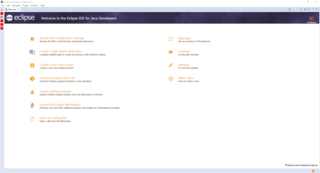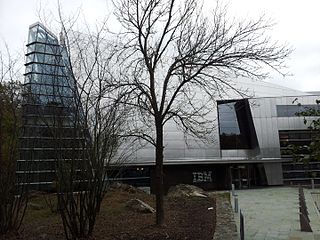
Computer programming is the process of designing and building an executable computer program for accomplishing a specific computing task. Programming involves tasks such as: analysis, generating algorithms, profiling algorithms' accuracy and resource consumption, and the implementation of algorithms in a chosen programming language. The source code of a program is written in one or more languages that are intelligible to programmers, rather than machine code, which is directly executed by the central processing unit. The purpose of programming is to find a sequence of instructions that will automate the performance of a task on a computer, often for solving a given problem. The process of programming thus often requires expertise in several different subjects, including knowledge of the application domain, specialized algorithms, and formal logic.

Fortran is a general-purpose, compiled imperative programming language that is especially suited to numeric computation and scientific computing.

An integrated development environment (IDE) is a software application that provides comprehensive facilities to computer programmers for software development. An IDE normally consists of at least a source code editor, build automation tools, and a debugger. Some IDEs, such as NetBeans and Eclipse, contain the necessary compiler, interpreter, or both; others, such as SharpDevelop and Lazarus, do not.

John Warner Backus was an American computer scientist. He directed the team that invented and implemented FORTRAN, the first widely used high-level programming language, and was the inventor of the Backus–Naur form (BNF), a widely used notation to define formal language syntax. He later did research into the function-level programming paradigm, presenting his findings in his influential 1977 Turing Award lecture "Can Programming Be Liberated from the von Neumann Style?"

R is a programming language and free software environment for statistical computing and graphics supported by the R Foundation for Statistical Computing. The R language is widely used among statisticians and data miners for developing statistical software and data analysis. Polls, data mining surveys, and studies of scholarly literature databases show substantial increases in popularity in recent years. as of March 2019, R ranks 14th in the TIOBE index, a measure of popularity of programming languages.

Numerical Recipes is the generic title of a series of books on algorithms and numerical analysis by William H. Press, Saul A. Teukolsky, William T. Vetterling and Brian P. Flannery. In various editions, the books have been in print since 1986. The most recent edition was published in 2007. In 2015 Numerical Recipes sold its historic two-letter domain name nr.com and became numerical.recipes instead.

Green Hills Software is a privately owned company that builds operating systems and programming tools for embedded systems. The firm was founded in 1982 by Dan O'Dowd and Carl Rosenberg. Its world headquarters are in Santa Barbara, California.
The PDP-9, the 4th of the five 18-bit minicomputers produced by Digital Equipment Corporation, was introduced in 1966. A total of 445 PDP-9 systems were produced, of which 40 were the compact, low-cost PDP-9/L units.

Code::Blocks is a free, open-source cross-platform IDE that supports multiple compilers including GCC, Clang and Visual C++. It is developed in C++ using wxWidgets as the GUI toolkit. Using a plugin architecture, its capabilities and features are defined by the provided plugins.
Currently, Code::Blocks is oriented towards C, C++, and Fortran. It has a custom build system and optional Make support.

Ken Kennedy was an American computer scientist and professor at Rice University. He was the founding chairman of Rice's Computer Science Department.

PGI, was a company that produced a set of commercially available Fortran, C and C++ compilers for high-performance computing systems. On July 29, 2013, NVIDIA Corporation acquired The Portland Group, Inc. The Portland Group name is now known as a brand of software development tools produced by NVIDIA Corporation.
Intel Fortran Compiler, also known as IFORT, is a group of Fortran compilers from Intel for Windows, OS X, and Linux.
EFL is a programming language originated by programmer A.D. Hall in the late 1970s and completed by Stuart Feldman. It was intended to improve on Fortran by adding control structures similar to those of C and was implemented as a preprocessor to a Fortran compiler. Its name is an initialism for Extended Fortran Language. It is roughly a superset of Ratfor.
BESYS was an early computing environment originally implemented as a batch processing operating system in 1957 at Bell Labs for the IBM 704 computer. It was developed because Bell recognized a "definite mismatch…between the 704's internal speed, the sluggishness of its on-line unit-record equipment, and the inherent slowness of manual operations associated with stand-alone use."
OS 2200 has had several generations of compilers and linkers in its history supporting a wide variety of programming languages. In the first releases, the Exec II assembler (SLEUTH) and compilers were used. The assembler was quickly replaced with an updated version (ASM) designed specifically for the 1108 computer and Exec 8 but the early compilers continued in use for quite some time.

Silverfrost FTN95: Fortran for Windows is a Fortran compiler for Microsoft Windows. It generates code for native IA-32 Win32, x86-64 and for Microsoft's .NET platform. FTN95 comes in three licensed editions: Commercial, Academic and Personal. The Personal edition is free and is designed for personal use. Programs written with the Personal edition show a banner for a short time when they are run.

WORHP ( "warp"), also referred to as eNLP by ESA, is a mathematical software library for solving continuous large scale nonlinear optimization problems numerically. The acronym WORHP is sometimes spelled out as "We Optimize Really Huge Problems", its primary intended application. WORHP is a hybrid Fortran and C implementation and can be used from C/C++ and Fortran programs using different interfaces of varying complexity and flexibility. In addition interfaces for the modelling environments MATLAB, CasADi and AMPL exist.
Absoft Fortran Compilers are set of Fortran compilers for Microsoft Windows, Apple Macintosh, and Linux produced by Absoft Corporation. The compilers are source code compatible across platforms.
Simply Fortran is an Integrated Development Environment (IDE) for FORTRAN 77, Fortran 90, Fortran 95, Fortran 2003 and Fortran 2008. The project is maintained by the company Approximatrix, LLC.














